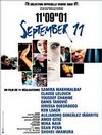|
|
||||
|
|
by Donald Levit  Analogous to a select composition class in which each student must write on the same subject, 11’09"01 – September 11 met with wildly disparate critical reaction on screening at the International Film Festivals of Venice and Toronto. Praise and condemnation alike appeared worldwide in such comments as "frank and honest," "not remotely adequate," "insulting," "anti-American," "harsh," "startling," "slow and off-beat," "weak," "gimmicky," "genuine," "hubris," "offensive," "unsettling," "strong," and so on. French producer Alain Brigand gave $400,000 and full artistic freedom to each of eleven international directors, along with the common theme of September 11 and the stipulation that, related to the other ten only by that theme, each segment be exactly eleven minutes, nine seconds, plus one frame. Of course, the resultant omnibus movie is uneven, as with any collection: one seldom appreciates all the paintings or stories, even within a "framework" like those of Chaucer or Boccaccio. Moreover, emotional or artistic objectivity is impossible about a wound so recent that it vitally affects and divides the world. (Forty years after its first appearance and six decades after the facts, doesn’t Rolf Hochhuth’s The Deputy continue to rile emotions in its Amen reincarnation?) A good portion of the reaction to Brigand’s mosaic comes from the political and social gut rather than from artistic assessment, that is, it turns on content instead of form and so fails to consider whether and how the project works as film. Ken Loach’s contribution, for example, won almost unanimous applause as well as Venice’s prize for the best short work. However, while one may sympathize (or not) with that British director’s linking the 2001 attack with the 9/11/1973 CIA-aided toppling of Allende’s elected government and the brutal régime that followed, the director tells but does not show. Loach simply allows a Chilean expatriate to talk a sad, angry letter he is writing. In the same way – once more, to leave aside political stances – Egyptian Youssef Chahine’s entry squeezes too much into his limited span but, even then, violates what film should do by preaching through an actor who plays a director and, again, instructs us. Except for the unusual entry by Mexico’s Alejandro González Iñárritu – news voices and chants over a black screen, cut by subliminal flashes of bodies falling from the Twin Towers – the rest tell stories, some better than others, some with seemingly marginal direct relevance. Possibly the best is the very opening sequence, in which Iranian Samira Makhmalbaf depicts the efforts of a serious young teacher to get her small pupils, some of the three million miserable Afghan refugees in Iran, to comprehend inconceivable disaster in an unimaginable city. Youngsters are central, too, to the wry piece by Idrissa Ouédraogo of Burkina Faso, where the poverty-stricken Ouagadougou boy Adama and three school friends set out with spears to capture Osama bin Laden and the – again unimaginable – twenty-five-million-dollar reward. Though some find it trivializing, and though it is sentimental, the Claude Lelouch piece sees the tragedy against a recent affaire between a lonely French deaf-mute who laments that "America is not made for cripples," and a sign language-speaking tour guide in New York. In a single take, apparently, Amos Gitai of Israel reenacts a terrorist car bombing in Tel Aviv to comment on chaos, anger, bloodshed and the self-absorption of the egotistical news media. The contribution from India, by Mira Nair, recounts a true story of sorrow and American xenophobic reaction in New York itself, while Danis Tanovic of Bosnia-Herzegovina quietly contrasts the media frenzy of 2001 with the little note nor long remembrance of the 9/11/1995 Srebrenica massacre. From Japan, Shohei Imamura drops his tale into a different place and time, a remote homeland island during the last days of World War II, for a parable on the dehumanization in violence and so-called Holy War. Sean Penn, the sole American representative, received an inordinate share of comment. Despite a boldly cast and gutsy Ernest Borgnine, Penn’s O. Henry-esque piece seems adrift, although perhaps it implies that individual lives and tragedies are all we can comprehend. A difficult film – or films – to describe, 11’09"01—September 11 will likely not sit well with fired-up Americans; indeed, it may not even find distribution here. That would be a loss. We probably won’t find a more comprehensive reaction to the event for considerable time to come. And it should be noted that, of the eleven uneven segments, the best are those which tell stories and bring great happenings to the level of individuals, particularly through and for children. If we are to learn from history and avoid its mistakes, where better to start? (Released by Bac Films; not rated by MPAA.) |
||
|
© 2026 - ReelTalk Movie Reviews Website designed by Dot Pitch Studios, LLC |



